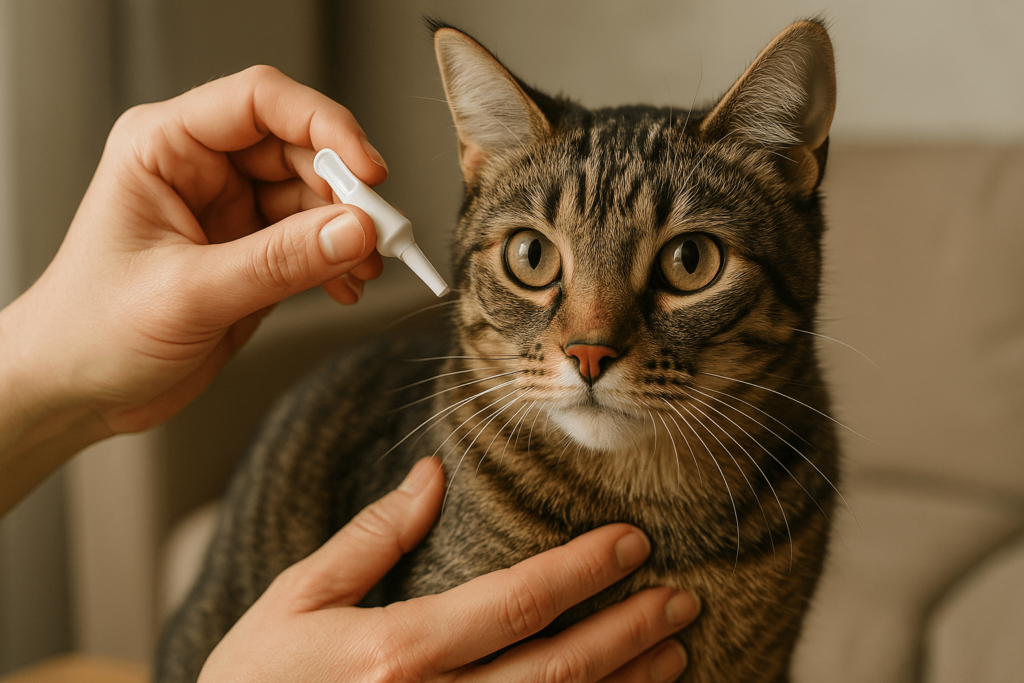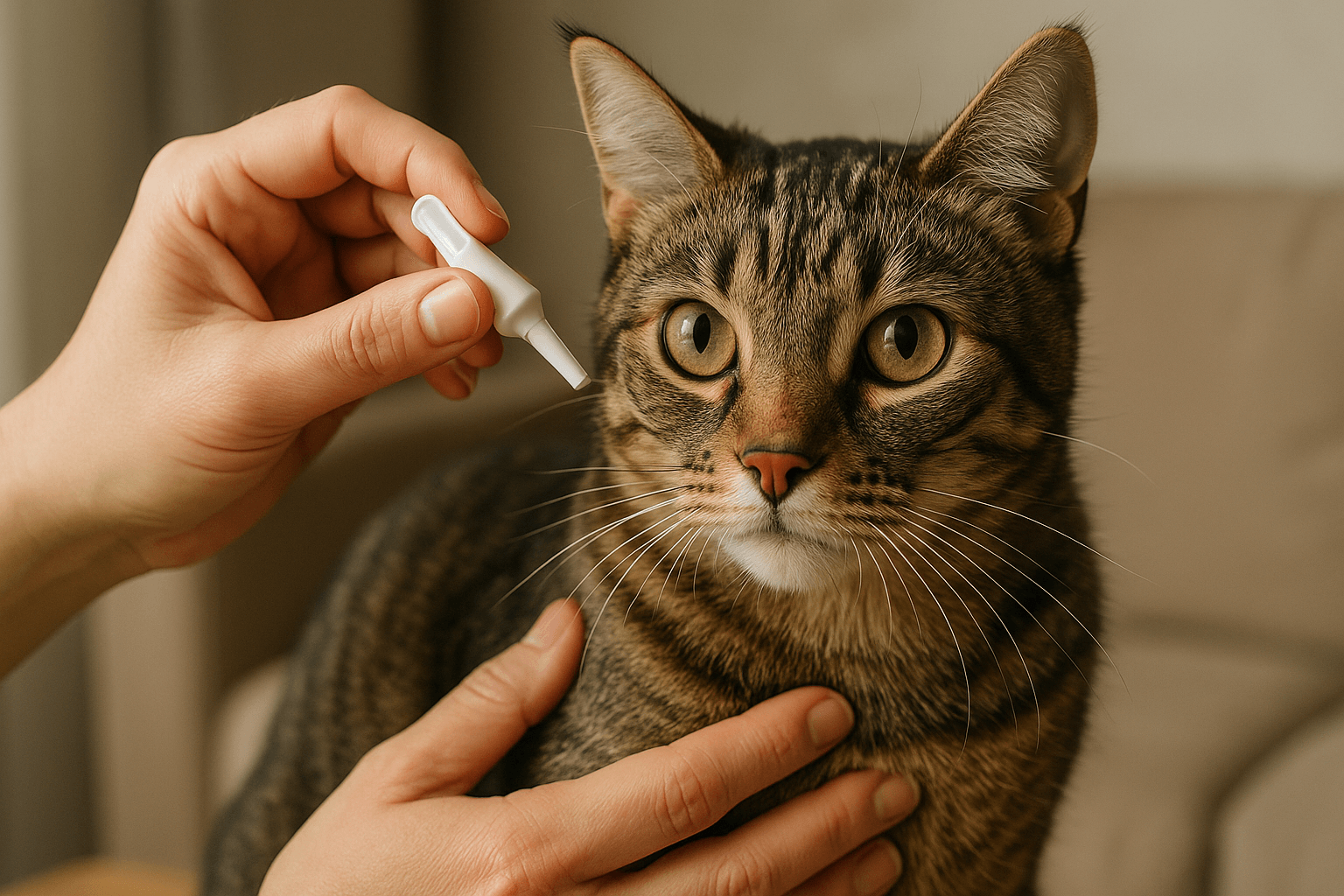Heartworm Prevention for Cats: Why It’s Non-Negotiable
Cats aren’t just small dogs—they’re unique, delicate predators with vulnerabilities that often go unnoticed. One of the most dangerous yet underappreciated threats? Heartworm disease. While commonly associated with dogs, heartworms can—and do—infect cats. And unlike in dogs, there’s no safe cure. Prevention isn’t optional. It’s your cat’s only lifeline.
Why Cats Are at Risk for Heartworm Disease
Heartworm isn’t a “dog problem.” It’s a mosquito-borne parasite that doesn’t discriminate. Even indoor cats are at risk. Here’s why your cat needs protection:
Mosquitoes Get Inside Too:
One mosquito bite is all it takes—even through screens or open windows. Indoor cats aren’t immune.Cats Are Accidental Hosts:
Unlike dogs, cats aren’t ideal hosts for heartworms, but that doesn’t stop larvae from migrating and causing damage.Symptoms Are Silent Until It’s Too Late:
Cats often show no signs until the disease is advanced—or until they suddenly collapse or die.No Approved Treatment Exists:
There’s no medication to kill adult heartworms in cats. Once infected, care is supportive only.Prevalence Is Higher Than You Think:
Studies show up to 25% of heartworm-positive cats are strictly indoor. Risk isn’t tied to outdoor access.
Heartworm prevention isn’t about fear—it’s about facts. Ignoring it is gambling with your cat’s life.

How Heartworm Disease Affects Cats Differently Than Dogs
The way heartworms behave in cats is terrifyingly different from how they behave in dogs. Understanding this distinction is critical.
Fewer Worms, Greater Damage:
As few as one or two adult worms can cause severe respiratory illness in cats, known as Heartworm-Associated Respiratory Disease (HARD).Larvae Cause Inflammation:
Even before worms mature, migrating larvae trigger intense lung inflammation, mimicking asthma or bronchitis.Sudden Death Is a Real Risk:
Cats can die suddenly from heartworms—no warning, no symptoms. Autopsies often reveal adult worms where no illness was suspected.Diagnosis Is Extremely Difficult:
Blood tests can miss infections. X-rays and ultrasounds are often needed, and even then, results are inconclusive.The Immune System Overreacts:
A cat’s body may mount a violent response to dying worms, causing shock, organ failure, or pulmonary thromboembolism.
This isn’t a slow, predictable disease. It’s a silent, unpredictable storm. Prevention is the only reliable shield.
Check this guide 👉Cat Parasite Prevention: Best 7 Expert Tips!
Check this guide 👉Hookworms in Cat Poop: Best 7 Expert Tips!
Check this guide 👉Tiny Black Worms on Cat: Best 7 Expert Tips!
| Heartworm Risk in Cats | Why Prevention Is Essential |
|---|---|
| Mosquitoes transmit larvae through a single bite | No cure exists—once infected, treatment is limited to symptom management |
| Indoor cats are just as vulnerable as outdoor cats | Prevention is simple, safe, and affordable compared to emergency care |
| Larvae cause severe lung inflammation (HARD) | HARD mimics asthma but is irreversible and life-threatening |
| Diagnosis is unreliable with standard blood tests | Relying on testing delays protection and increases risk |
| Sudden death can occur without prior symptoms | Prevention is the only way to guarantee your cat’s survival |
Common Myths About Feline Heartworm Disease
Misinformation is deadly. Don’t let myths convince you your cat is safe.
Myth: “Cats don’t get heartworms.”
False. Cats are susceptible. Studies confirm infection rates in cats rival those in dogs in high-risk areas.Myth: “If my cat never goes outside, they’re safe.”
Mosquitoes enter homes. One bite. One chance. That’s all it takes.Myth: “Heartworms in cats aren’t serious.”
They are. Even one worm can trigger fatal respiratory collapse or sudden death.Myth: “I can just test my cat and skip prevention.”
Tests miss up to 50% of infections. Negative results don’t equal safety.Myth: “Only dogs need monthly preventives.”
Cats need them just as much—if not more—because they have no treatment options.
Your cat doesn’t need a diagnosis. They need protection. Don’t wait for symptoms. They won’t come until it’s too late.
How Heartworm Preventives Work in Cats
Heartworm preventives aren’t miracle drugs—they’re precision shields. Here’s how they protect your cat:
Target Larvae, Not Adults:
Preventives kill immature heartworm larvae (microfilariae) before they mature into adults—no worm, no crisis.Monthly Consistency Is Key:
Missing even one dose leaves a window for larvae to survive and migrate into the heart and lungs.Topical and Oral Options Exist:
Liquid applied to the skin or flavored chewables are equally effective—choose based on your cat’s preference.Combined Protection Is Common:
Most preventives also guard against fleas, ticks, and intestinal worms—maximizing value and convenience.Prescription Only, But Easy to Use:
Your vet will recommend the safest, most effective option based on your cat’s age, weight, and lifestyle.
Prevention isn’t complicated. It’s consistent. It’s monthly. It’s non-negotiable.
When and How to Start Heartworm Prevention
Timing matters. Starting early—and never stopping—is your best defense.
Begin at 8 Weeks Old:
Kittens can start preventives as early as 8 weeks. Don’t wait until they’re adults.Year-Round Protection Is Essential:
Mosquitoes thrive in warmer months—but many species survive indoors year-round. Skip nothing.Test Before Starting (If Over 6 Months):
Adult cats should be tested for existing infection before starting preventives, though this is rarely required for kittens.Never Miss a Dose:
Set phone reminders. Link it to a daily habit—like feeding or brushing teeth. Consistency saves lives.Re-Test Annually:
Even with prevention, annual testing confirms your cat remains protected and helps track regional risk levels.
Your vet will guide you, but the decision is yours. Make it now—not when your cat starts coughing.
Top 5 Heartworm Preventives for Cats (Vet-Recommended)
Not all preventives are created equal. Here are the most trusted options, based on safety, efficacy, and ease of use:
Revolution Plus (Selamectin + Sarolaner):
Topical monthly treatment that prevents heartworms, kills fleas, ticks, and treats intestinal parasites.Advantage Multi (Imidacloprid + Moxidectin):
Topical formula that prevents heartworms and controls fleas, hookworms, roundworms, and ear mites.Heartgard for Cats (Ivermectin):
Oral chewable, beef-flavored, monthly tablet proven safe and effective for heartworm prevention.Interceptor Plus (Milbemycin Oxime + Praziquantel):
Oral chewable that prevents heartworms and treats tapeworms and intestinal worms.Broadline (Fipronil + S-Methoprene + Eprinomectin + Praziquantel):
Topical solution for cats that prevents heartworms, fleas, ticks, and intestinal parasites.
Always consult your vet before switching products. Your cat’s needs may require a specific formulation based on health, environment, or parasite exposure.
What Happens If You Skip Prevention?
The consequences of skipping heartworm prevention aren’t hypothetical. They’re tragic—and often permanent.
Respiratory Collapse:
Cats develop HARD—chronic coughing, wheezing, rapid breathing—often misdiagnosed as asthma.Sudden Death:
Up to 50% of infected cats die suddenly, with no prior signs. Autopsies reveal adult worms in otherwise healthy cats.Irreversible Lung Damage:
Even if the worm dies, inflammation leaves permanent scarring in the lungs.Costly Emergency Care:
Hospitalization, oxygen therapy, steroids, and monitoring can cost $2,000–$5,000. Prevention costs $10–$20/month.Emotional Trauma:
Losing a cat to a preventable disease is devastating. You can’t undo it. You can only prevent it.
A single missed dose isn’t a mistake. It’s a gamble. And your cat is the one betting their life.
FAQ: Heartworm Prevention for Cats
Can my indoor cat get heartworms?
Yes. Mosquitoes enter homes through open doors, windows, or even small gaps. Indoor cats are at real risk.
Is heartworm disease fatal in cats?
Yes. There is no approved treatment to kill adult worms. Many cats die suddenly or suffer lifelong respiratory issues.
Do I need to test my cat before starting prevention?
For kittens under 6 months, no. For older cats, yes—testing ensures no adult worms are already present.
Can I use dog heartworm medicine for my cat?
Never. Dog preventives contain ingredients toxic to cats. Always use products labeled specifically for cats.
How long does it take for heartworms to develop in cats?
About 6–7 months from the mosquito bite to adult worms. Prevention must be continuous to block this cycle.
Protect What You Love—Before It’s Too Late
Heartworm prevention for cats isn’t about being cautious. It’s about being responsible. It’s not a luxury. It’s not optional. It’s the single most effective thing you can do to ensure your cat lives a long, healthy, vibrant life.
You don’t need to wait for symptoms.
You don’t need to hope for the best.
You don’t need to risk a sudden, silent loss.
Can I Give My Cat Midol? Best 7 Expert Tips! – Learn the risks, symptoms, and safe alternatives to keep your cat healthy and avoid toxic reactions.
Can I Give My Dog Midol? Best 7 Expert Tips! – Discover the risks, safe alternatives, and expert advice to keep your dog safe from accidental poisoning.
Maximum Weight for Cats on Planes: Best 7 Expert Tips! – Learn airline policies, tips to stay compliant, and ensure safe travels for your feline friend.
Max Weight for Dogs on Planes: Best 7 Expert Tips! – Discover airline weight limits, safe travel tips, and solutions for flying with your dog stress-free.





